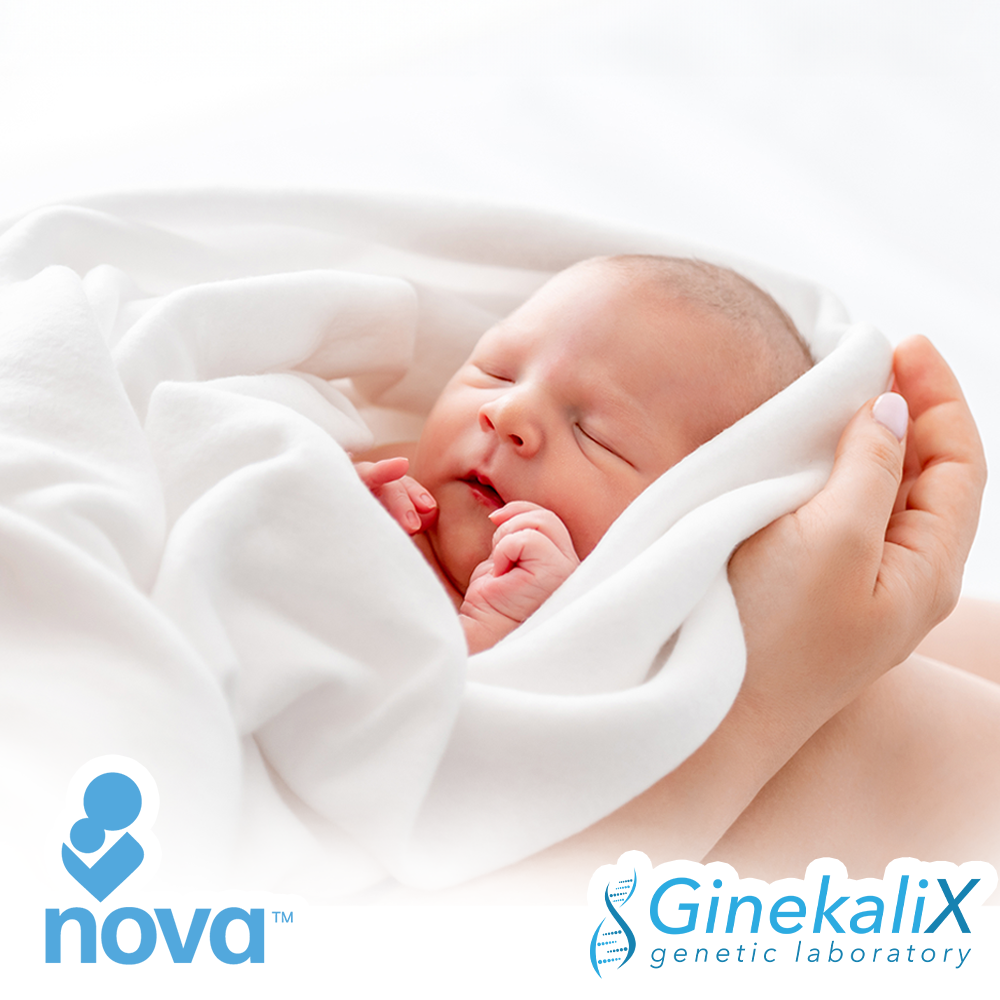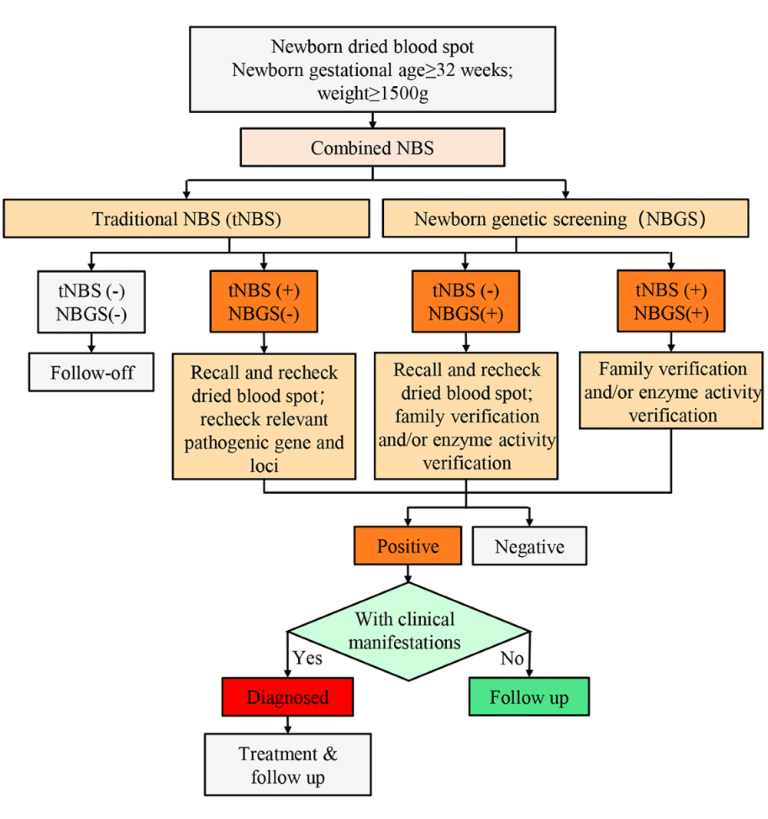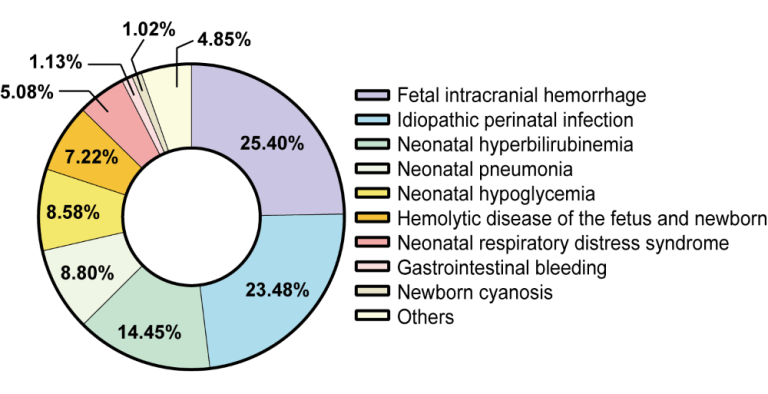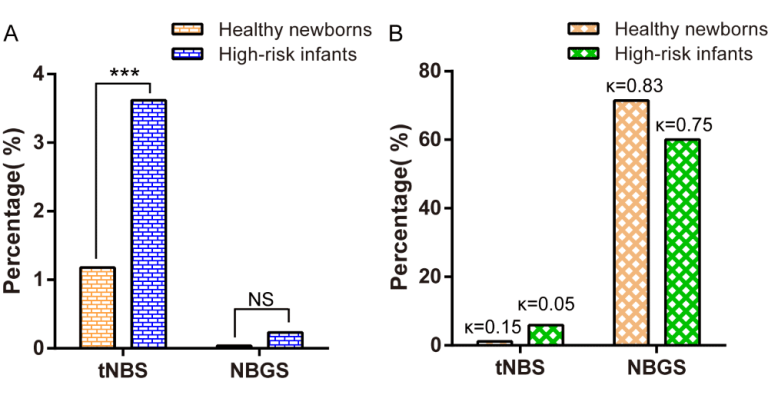Neonatal Care: Results from the NOVA™ Newborn Genetic Screening Study

In neonatal care, early detection of genetic conditions plays a key role in charting life for the newborn. This critical time window of opportunity not only saves lives, but also significantly improves the quality of life for affected infants and their families. Newborn Genetic Screening (NBGS) is emerging as a transformative tool in modern healthcare, offering unparalleled insights into the newborn's genetic makeup.
What is Newborn Genetic Screening (NBGS)
NBGS represents a significant advance over traditional newborn screening methods. While traditional screenings primarily rely on biochemical markers to detect a limited number of health conditions, NBGS uses cutting-edge genetic sequencing technology to analyze an infant's DNA. This approach enables the identification of a much wider spectrum of genetic disorders with greater accuracy and a lower false-positive rate, paving the way for personalized medical interventions that improve health outcomes in high-risk infants.
Imperative for newborn genetic screening
Despite the key role of traditional newborn screening (tNBS) in the early detection and management of congenital disorders, its limitations highlight the urgent need for more comprehensive methodologies such as NBGS. The narrow focus of tNBS leaves many genetic disorders undetected, delaying diagnosis and treatment for conditions that could be more effectively managed if identified earlier.
NOVA™ – pioneering neonatal genetic screening
Genetic screening for newborns with NOVA™ represents a monumental leap in neonatal healthcare, offering an incomparably comprehensive genetic analysis . Using advanced next generation sequencing (NGS) technologies, NOVA™ screens for a wide variety of genetic diseases, including rare disorders that traditional screening may miss. This innovative approach provides faster, more accurate and more accessible detection of genetic conditions in newborns, making it a cornerstone of modern neonatal care.
Unparalleled insight with NOVA™ Newborn Genetic Screening
The NOVA™ newborn genetic screening test is at the forefront of addressing the global challenge of high-risk newborns. By determining risk for 246 genes associated with 112 genetic diseases, including 254 disease subtypes, NOVA™ offers unparalleled genetic insight into newborn health. This comprehensive screening test is suitable for parents who want a thorough genetic assessment of their baby, as well as for babies who may have missed regular screening or come from families with a history of hereditary disorders or have been identified as high-risk for genetic diseases.
Comprehensive Study Summary: Advancing Neonatal Care Through Newborn Genetic Screening
A recent study led by Xin Wang and Yun Sun of Nanjing Maternity and Child Health Hospital, published in < b>Journal of Global Health, presents newborn genetic screening (NBGS) as a more comprehensive and accurate approach, especially useful for high-risk infants. This study aimed to evaluate the efficacy of NBGS compared with traditional newborn screening (tNBS) for identifying genetic disorders in newborns, with a focus on high-risk infants.
Method and findings
The study involved screening 10,334 healthy newborns and 886 high-risk newborns using NBGS and tNBS. High-risk infants were identified based on specific neonatal conditions and prematurity. The results highlighted several key findings:
- Increased disease detection: NBGS detected 94 genetic diseases, significantly more than the 37 diseases detected by tNBS. This spectrum of detection is vital for early intervention and management of genetic disorders.

- Superior specificity: When comparing primary screening results between NBGS and tNBS in high-risk infants, the study found a positive primary screening rate of 0.54% with NBGS versus 3.68% with tNBS. This significant difference indicates the superior specificity of NBGS for identifying genetic markers associated with high-risk symptoms, and thus the better accuracy for disease detection in this vulnerable population.

- Enhanced diagnostic accuracy: The study reported a higher positive predictive value (PPV) of 60.00% for NBGS in high-risk infants compared to 5.88% for tNBS. This significant increase in PPV highlights the increased diagnostic accuracy of NBGS for identifying genetic diseases in high-risk infants, facilitating early intervention and personalized treatment strategies to improve clinical outcomes.

- Reduced False Positive Rate: The false positive rate (FPR) for high-risk infants screened with NBGS was significantly lower – 0.22%, compared to 3.47% with tNBS. This suggests that NBGS based on targeted probe-based NGS technology can effectively reduce false-positive results and improve the accuracy of screening results in high-risk infants, thereby minimizing unnecessary interventions and easing the psychological burden of the families.
The study concludes that combined newborn screening, especially using NBGS, can effectively reduce the false-positive rate caused by high-risk symptoms and improve the positive predictive value in high-risk newborns. These findings highlight the importance of implementing NBGS as a standard practice in neonatal care, especially to identify genetic disorders in high-risk neonates and facilitate early interventions for better clinical outcomes.
Enabling better decisions, improving clinical outcomes
These findings highlight the importance of adopting advanced screening methods such as NBGS to improve early detection rates of genetic disorders. Clinically, the adoption of NBGS can improve the prognosis and quality of life of affected children. In addition, reducing false positives can lead to more efficient use of health care resources. In conclusion, this research lays the groundwork for further research in newborn genetic screening to improve health care outcomes for high-risk infants worldwide.
Implementing NBGS in healthcare practice
Integrating NBGS into neonatal care requires aligning healthcare practices with the latest genetic technologies. Healthcare professionals must be trained in these advances to ensure seamless integration into existing care protocols. Their role is critical in educating parents about the benefits and implications of NBGS, guiding informed decision making.
Frequently asked questions
- What is Newborn Genetic Screening (NBGS)?
NBGS is a state-of-the-art medical procedure that involves analyzing a newborn's DNA for early detection of genetic disorders. - How does NBGS differ from traditional newborn screening methods?
Traditional newborn screening typically tests for a limited number of conditions using biochemical markers. In contrast, NBGS uses advanced genetic sequencing technologies to analyze an infant's entire genetic code, allowing for the detection of a wider range of genetic disorders with greater accuracy. - What are the benefits of NBGS?
NBGS offers several benefits, including:
- Early detection of a wider range of genetic disorders.
- Greater accuracy in diagnosis, which leads to more effective interventions.
- Potential for personalized medical treatments.
- Contribution to a deeper understanding of neonatal genetics and public health strategies. - What is NOVA™?
NOVA™ is a comprehensive newborn genetic screening service at Gynecalyx Genetics Laboratory. It uses advanced sequencing technology to screen for a wide range of genetic diseases, providing faster and more accurate results. - How does NOVA™ contribute to neonatal care?
NOVA™ plays a key role in improving neonatal care by enabling early detection and intervention in genetic disorders. Its comprehensive genetic analysis empowers healthcare professionals and parents with valuable information to make informed decisions about newborn health and treatment. - Is NBGS suitable for all newborns?
NBGS can benefit all newborns, but may be particularly beneficial in high-risk infants or those with a family history of genetic disorders. Healthcare professionals can determine the appropriateness of NBGS based on individual circumstances. - Is NBGS safe for newborns?
Yes, NBGS is considered safe for newborns. The procedure involves a simple blood test or saliva sample and poses minimal risk to the infant. - Can NBGS predict all genetic disorders?
Although NBGS can detect a wide variety of genetic disorders, it may not identify all possible conditions. Additionally, some genetic disorders may develop later in life and may not be detected through newborn screening. - How can health care professionals incorporate NBGS into their practice?
Health care professionals can integrate NBGS into their practice by staying informed about the latest genetic technologies, educating parents about the benefits of NBGS and will work with genetic counselors and other specialists to effectively interpret and act on screening results.
